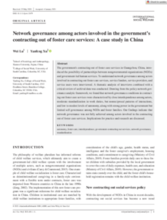Displaying 31 - 40 of 195
This study examined the longitudinal association of depressive symptoms with grandchild care intensity and whether the association varies by household structure, residential area, and gender for Chinese grandparents.
With permission from Uyghur parents desperate for answers, for this video, CNN's David Culver traveled to the heavily surveilled Xinjiang region in search of their children left behind.
"Mass incarceration of Uyghurs in northwestern China’s Xinjiang Uyghur Autonomous Region (XUAR) has scattered some 500,000 Uyghur children in boarding schools, orphanages, and other institutions run by the Chinese state—a state that experts say is committed to the long-term eradication of the ethnic group," says this article from Radio Free Asia.
Using data collected from two provinces in China through an online survey, the current study aimed to investigate left‐behind children's emotional and academic adjustment during the COVID‐19 pandemic in China.
"China has forcibly separated Uighur families by taking young children into state orphanages, according to human rights group Amnesty International," says this article from BBC News.
To understand network governance among actors involved in contracting out foster care services, service funders, service providers, and service users were interviewed. A thematic analysis of interviews combined with a critical review of archival data was conducted.
This article presents evidence of son preference in the child trafficking market for illegal adoption in China, where son preference is explicitly revealed by choice and quantified by the price premium of a boy.
Using three waves of the China Family Panel Studies data collected in 2010, 2012 and 2014, the current study examines the association between parental migration and a number of early childhood development (ECD) outcomes.
The authors of this study examined attitudes about child maltreatment in China and the Netherlands.
A cross-sectional study was conducted in five counties of five provinces in China to investigate the effects of age at separation and duration of maternal separation on the early development of left-behind children.


